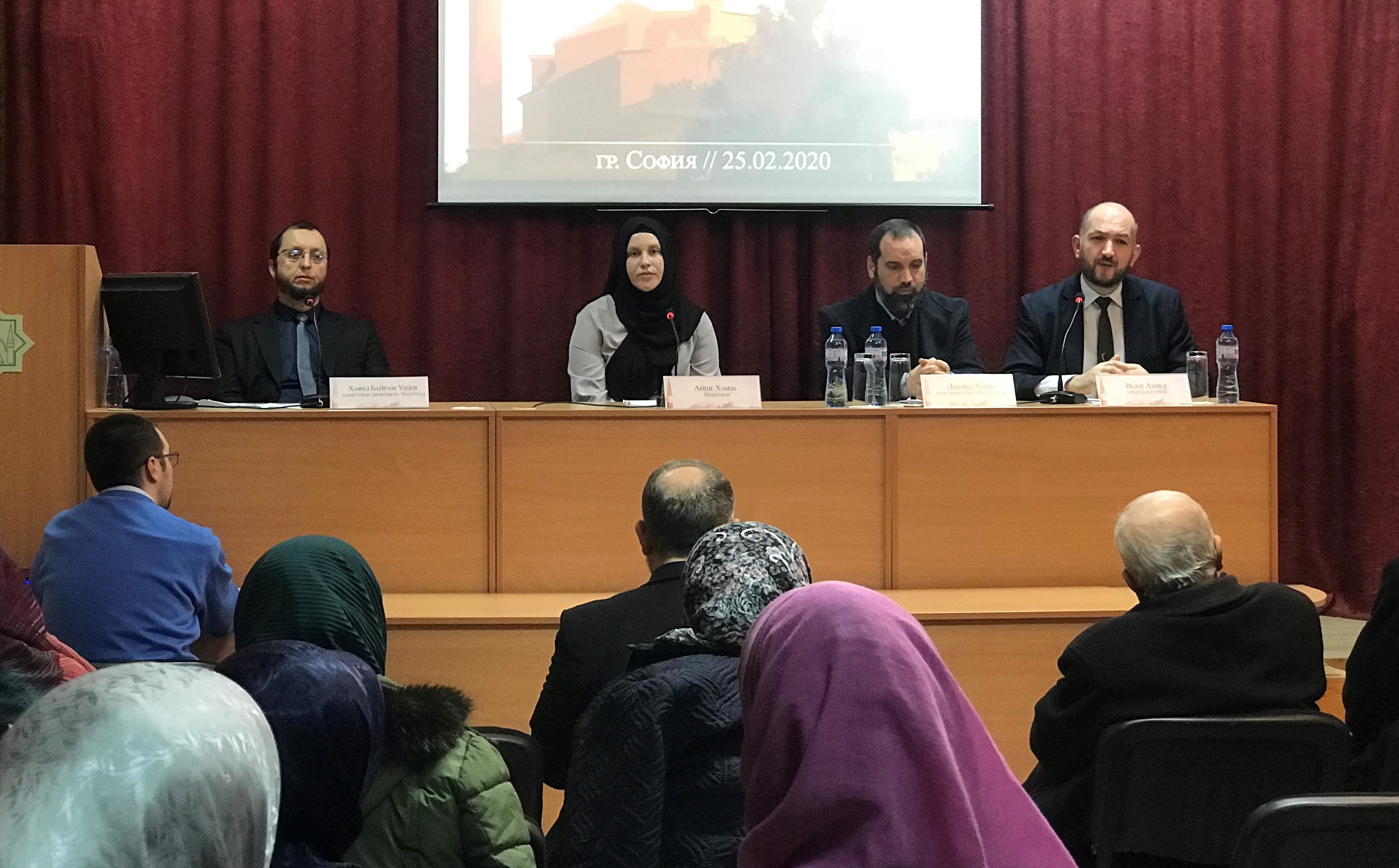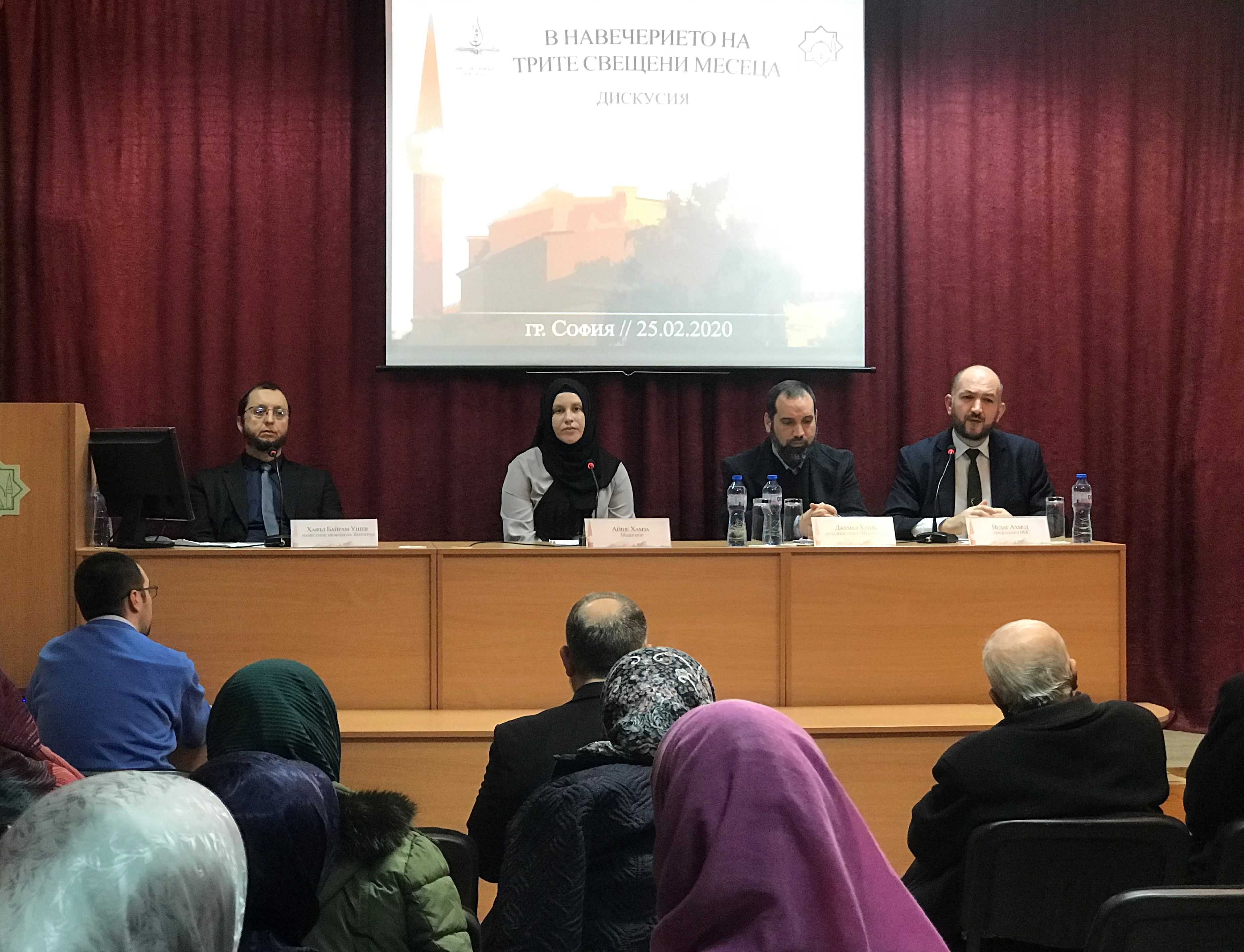News

For another year the three gracious months Rajab, Sha’ban and Ramadan were welcomed with a thematic discussion in Sofia
26 February 2020
“On the eve of the three sacred months” was the topic of the already traditional annual discussion, which Grand Mufti’s Office organizes on the occasion of the beginning of the months of Rajab, Sha’ban and Ramadan. The discussion event this year took place on February 25 (Tuesday), 2020, the first day of the month of Rajab, from 18:30 o’clock in the Media and Culture Center at Grand Mufti’s Office.
The official participants in the discussion event were the Chairman of the Supreme Muslim Council (SMC) Vedat Ahmed, the Head of Publishing Department at Grand Mufti’s Office Dzhemal Hatip and hafiz Bayram Ushev – Deputy Mufti of the town of Zlatograd. Moderator of the event was Ayshe Amza – student in the Higher Islamic Institute (HII) in Sofia.
The three participants presented respectively the months of Rajab, Sha’ban and Ramadan according to their sequence in the Islamic calendar.
What exactly is the importance of the month of Rajab and how we understand its “inviolability” according to the Islamic theory, based on the Qur’an and the Sunnah of the Prophet Muhammad (pbuh)? How it is “separated” from the other three so called “forbidden months” and what is its superiority over the other months of the year… These and many other issues were addressed by Vedat Ahmed in the framework of his presentation during the discussion. He cited different narrations of Muhammad (pbuh), proving the more special place of the month of Rajab in the Islamic calendar. One of his focuses was that according to most of the scholars there is no special recommendation for acts of worship such as fasting, for example, performed during the month of Rajab, but there is also no prohibition. He made an appeal that we try to make a clear distinction between the obligatory and voluntary (nafile) acts of worship in this month, not to limit ourselves with performing different types of additional acts of worship, but not to turn this into fard (obligatory).
“Our aim should be to approach in a way that, on the one hand, not to neglect our tradition, but also to give the necessary, without going beyond the boundaries set by the Islamic sources.” – the SMC Chairman Vedat Ahmed commented.
“The month of Rajab is the time of planting the crops, Sha’ban is the month of irrigation, and Ramadan is the time of reaping the harvest. If we began from now to prepare, to devote to Allah, to spend more time for our acts of worship and to separate from our bad habits, we will be better prepared for the month of Ramadan and our harvest will be bigger.” – he further added, and ended his presentation with the dua (supplication) of our beloved Prophet:
“Oh, Allah, bless us in the months of Rajab and Sha’ban and let us reach again the month of Ramadan!”
Dzhemal Hatip whose topic in the held discussion was dedicated to the month of Sha’ban, drew the attention to the disagreements between the scholars about the “sacredness” of the three months. “We do not have evidence in the Qur’an that they are sacred, but there is evidence that they are superior to the other months of the Islamic calendar”, Hatip concluded. He gave examples with dozens of narrations (adadith) of Muhammad (pbuh) proving the superiority of the month of Sha’ban and quoted also many other narrations related to the importance of the fasting in this month, which the Prophet (pbuh) attached.
In connection with the night of Beraat from the month of Sha’ban Dzhemal Hatip also supported what was said from the previous participant – it is not something wrong if a person performs acts of worship that night but it is not right to turn certain acts of worship into a fard (obligatory) ourselves. According to scholars mentioned by him, it is not accepted also to make group acts of worship and to oblige people to perform certain kinds of worshipping.
In the framework of the discussion hafiz Bayram Ushev, Deputy Mufti of the town of Zlatograd, presented, as he said “the most honorable of all months, which Allah has given us”. Where is the only place in the Holy Qur’an where the name of the month of Ramadan is mentioned, what is the importance of the fasting and how exactly Allah commanded this act of worship for the time of the month of Ramadan in the Holy Book?
“Fasting itself is not something that brings us physical deprival. It brings something which leads to a change in our inner “Self”. Not the fasting but the change which should appear in the person is the important.” – commented hafiz Bayram Ushev, quoting verse 183 from surah “Baqarah” of the Holy Qur’an. In his presentation he traced the historical chronology of fasting as an obligatory act of worship in Islam, giving an example that for 15 years Muslims were fasting only one single day a year. Yet after that was revealed the verse which commands the obligatory fasting for an entire month.
Ushev commented also all things with which the month of Ramadan stands out and is superior to the other months, focusing on the importance of reading the Holy Qur’an in the original and exactly how its reading in the original has a great impact on the heart and the soul of the person. He urged us not to underestimate the dua (supplication) and its power citing verse 186 from surah “Baqarah”, which says:
“And when My servants ask you, [O Muhammad], concerning Me - indeed I am near. I respond to the invocation of the supplicant when he calls upon Me. So let them respond to Me [by obedience] and believe in Me that they may be [rightly] guided!”
The discussion was closed by the moderator Ayshe Amza who thanked the official participants and all attendees after which the guests were invited by the organizers for a small treat.
Author: L. Chausheva